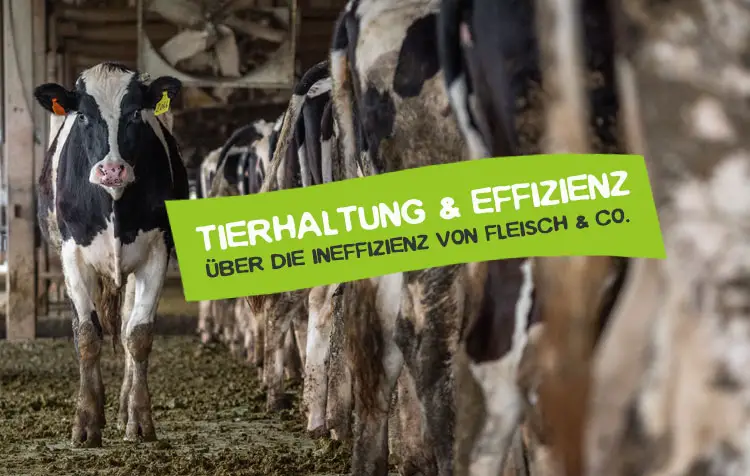You want to know more about the efficiency of meat, milk, eggs or cheese? Then you've come to the right place. It's not just compassion for innocent cows, pigs or chickens that motivates people to eat a plant-based diet. Ecological-ethical motives also play a major role. These include, above all, the extreme inefficiency of animal food production. Because even if the system of the industry is trimmed to efficiency from the point of view of those responsible, the benefit for the world (society) is the exact opposite - and this regardless of whether we are talking about animals from the Factory farming or talk about an idyllic organic farm.
In this article, I'd like to briefly and concisely explain the most important facts surrounding the efficiency of meat and other animal foods - and show you why exploiting animals to enrich our taste buds is a phase-out model. Let's go!
In advance you can find a short overview of the article here:
Why we need to talk about the efficiency of meat, eggs, milk and cheese
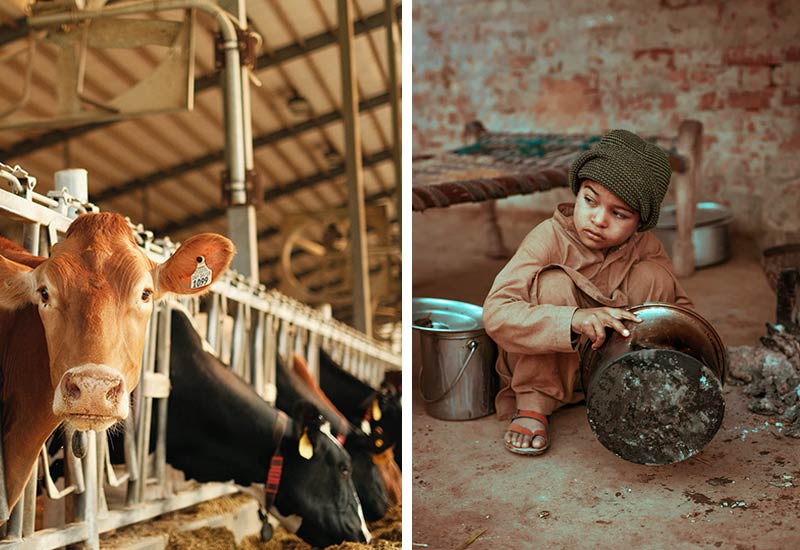
If something is efficient, then it has a high level of effectiveness when measured against its use. In simplified terms, efficiency means, achieve a lot with relatively little effort. In this case, the production of food is the effort. But what is this effort for in the first place? The goal to be achieved is above all to feed all the people in the world as sustainably and healthily as possible - and to solve social problems like the Stop world hunger.
Unfortunately, the production of animal-based foods such as meat, eggs and dairy products distances us from these goals, because of the high cost (fodder cultivation, grazing areas, transports, water consumption, CO2 and methane emissions, etc.). is necessary. By 2050, the already very high global demand for meat is expected to increase by an alarming 73 percent.₁
The possibility conserve natural resources and the plants grown directly and evenly without the "detour animal to consume is the reason that we must necessarily talk about the efficiency of animal foods.
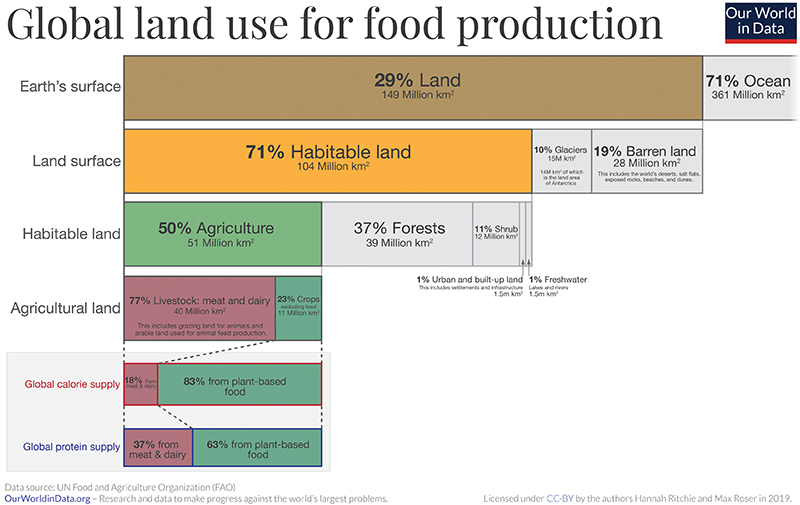
Utilized agricultural area for animal and plant foodstuffs
The data is clear: "livestock farming" for meat and milk occupies, according to UN Food and Agriculture Organization (FAO) already today with 77 percent more than three quarters of the world's arable land. Only 23 percent of this area is used to grow crops for our direct consumption.₂
This alone massive area expenditure for animal food is one of the reasons why the efficiency of meat, milk or eggs is truly subterranean in terms of benefit to us humans and all life on earth. Yet it is only one of several factors that determine efficiency.
Good to know: To satisfy our meat cravings, for example, we Germans claim 11.7 million hectares of agricultural land abroad.₃
Shares of animal products and vegan foods in global calorie supply
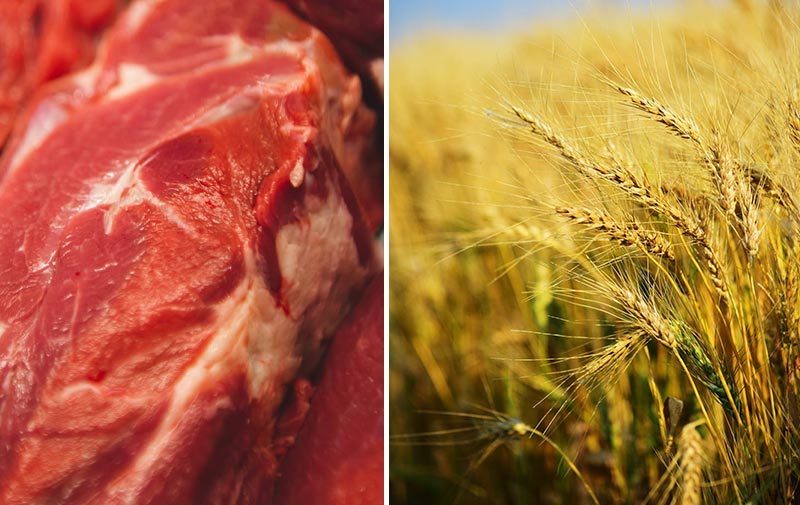
The inefficiency becomes even more tangible if we add another aspect: namely, the share in the Calories provided worldwidewhich are generated by the surface effort just described.
Although "animals as food producers" already occupy 77 percent of the world's land area, they provide only 18 percent of the calories that the growing world population records. The The production of plant-based food is much more efficient - on 23 percent of the available land area grows 82 percent of the calories consumed by mankind.
The shares of meat and plants in the global protein supply
Many people assume that they would not get enough protein without meat - but this is a common misconception. Only 37 percent of the global protein intake in our diets comes from animal products such as meat and milk - and take up 77 percent of the land area for it. A full 63 percent of protein comes from direct consumption of plant foods (e.g. broccoli, chickpeas, beans, oatmeal), for which only 23 percent of global land area needs to be cultivated.
Tip: In a detailed article you can now also read about other, vegan protein sources inform
Inefficient animal husbandry - Everyone can benefit from a plant-based diet
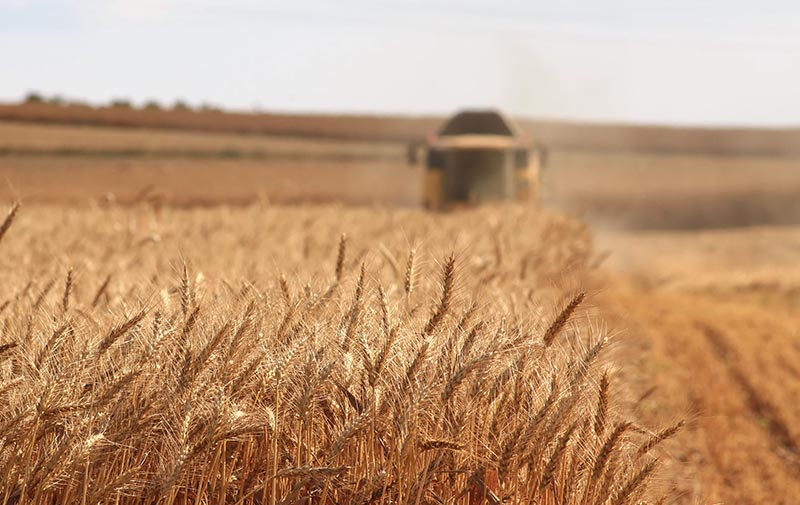
Apart from the moral issue of their exploitation, animals are quite simply inefficient suppliers of nutrients. With a lot of land, a lot of animal suffering, and a high consumption of energy and water, we produce a small portion of our food. This is absurdly inefficient. With significantly less land, water and energy consumption - and, of course, less animal suffering - a plant-based diet could produce significantly more food for us humans.
This is much more efficient and ultimately saves us humans from ourselves in view of the forecasts of increasing meat consumption. At the same time, the vegan diet also helps to free up more land for nature and animals. For example, the Species extinction stopped be
The system of livestock farming is a sick discontinued model - and is already only artificially respired by government subsidies. Every intelligent economist in the world would keep his hands off it.
Do you have any questions or suggestions regarding this article about the efficiency of meat, eggs or milk? Then I look forward to your comment.
Stay efficient,

PS.: In a separate post I explain to you once again all my personal Motives for the vegan way of life.
References:
₁ UN Food and Agriculture Organization (FAO); OurWorldinData.org: Global meat consumption, World, 1961 to 2050. Available at https://ourworldindata.org/grapher/global-meat-projections-to-2050 [11.04.2022].
₂ UN Food and Agriculture Organization (FAO); OurWorldinData.org: Global land use for food production, available at https://ourworldindata.org/agricultural-land-by-global-diets. [11.04.2022].
₃ Bund für Umwelt und Naturschutz Deutschland e.V. (BUND). (BUND): Meat consumption by Germans harms climate and environment abroad (as of 09.02.2021), available at https://www.bund.net/themen/aktuelles/detail-aktuelles/news/fleischkonsum-der-deutschen-schadet-klima-und-umwelt-im-ausland. [11.04.2022].

